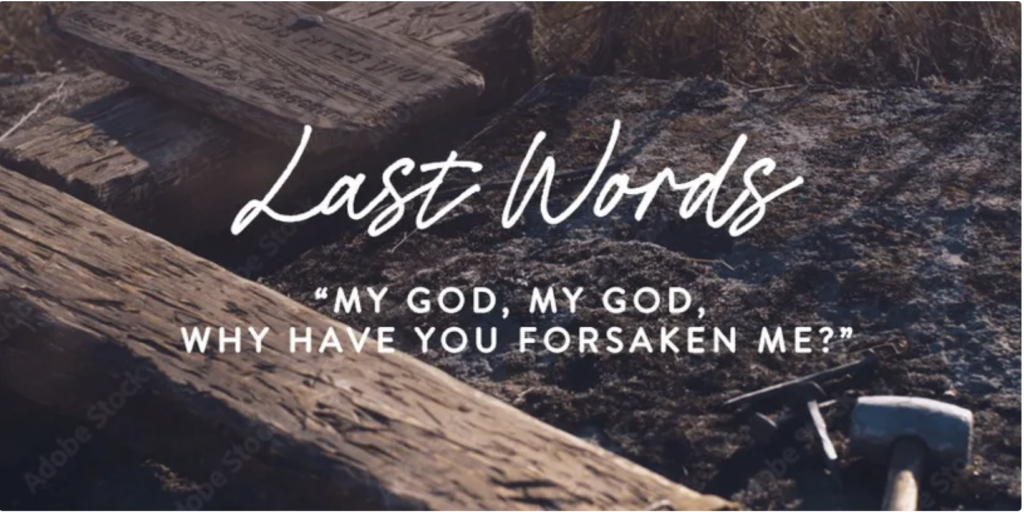
What is the heaviest weight you’ve ever born?
Most likely it wasn’t a physical weight—unless you’ve ever been stuck under a tree or a car. Most likely, the weight that bore down on you most was a crushing pain to your heart. Suffering a loss that’s too great to bear.
When Jesus hung on the cross, He felt the full agonizing weight of our sin—a weight no mere human could bear and survive.
And He felt the searing loss of His Father’s presence.
In His agony, He cried out a lament of despair.
“My God, My God, why have You forsaken Me?”
—Mark 15:34
Did Jesus truly not understand what God was doing?
Had anguish muddled His understanding?
Was this the first question Jesus ever asked that He didn’t already know the answer to?
Blood poured down Jesus’ face, mingled with His sweat, and stung His eyes, but His vision remained clear.
Despite His agony, Jesus was never confused. He was quoting the first verse in Psalm 22, a psalm that overflows with prophecies about the Messiah. About Him.
A Cry of Triumph
Jesus wasn’t in despair. He was voicing a cry of triumph—anguished triumph.
“My God, My God, why have You forsaken Me?”
—Psalm 22:1
Every Jewish leader knew Psalm 22:1. They could recite the entire psalm—including every verse that pointed to this moment. To Jesus forsaken on the cross.
Psalm 22 answered the chief priests’, scribes’, and elders’ taunts.
The chief priests, with the scribes and elders, mocked him and said, “He saved others, but he cannot save himself! He is the King of Israel! Let him come down now from the cross, and we will believe in him. He trusts in God; let God rescue him now—if he takes pleasure in him! For he said, ‘I am the Son of God.’”
(Matthew 27:41–43)
God did indeed take pleasure in Jesus because He didn’t come down from the cross. Because He is the fulfillment of every Messianic prophecy in Psalm 22.
Everyone who sees me mocks me; they sneer and shake their heads: “He relies on the Lord; let him save him; let the Lord rescue him, since he takes pleasure in him.” (Psalm 22:7–8)
*I am poured out like water, and all my bones are disjointed; my heart is like wax, melting within me.
My strength is dried up like baked clay; my tongue sticks to the roof of my mouth. You put me into the dust of death.
For dogs have surrounded me; a gang of evildoers has closed in on me; they pierced my hands and my feet.
I can count all my bones; people look and stare at me.
They divided my garments among themselves, and they cast lots for my clothing.
(Psalm 22:14–18)
*
Their descendants will serve him; the next generation will be told about the Lord.
They will come and declare his righteousness; to a people yet to be born they will declare what he has done.
(Psalm 22:30–31)
The leaders had rejected their Messiah and crucified Him—just as God had ordained long ago.
Jesus was willing to pay the full penalty for our sin, even though it meant He must be forsaken—He must be removed from God’s presence, an agony worse than any physical pain.
Jesus Was Forsaken So We Could Be Redeemed
Jesus let the chief priests, scribes, and elders know—along wtih everyone who’s read His words since—that He was forsaken so we who trust in Him will never be.
He stayed on the cross and died to pay the full price for our sins, so we don’t have to pay it.
That’s the power of the cruel cross, and Psalm 22 declares it.
Because I Love You!
In response to Jesus’ cry, “My God, My God, why have You forsaken Me?” God’s heart cries out to us, “Because I love you.”
Which of us would hand over our own beloved son to be tortured and forsaken for our friends, much less our enemies?
Who among us would pour out their own fierce wrath upon their beloved son for the sin of those who spit on him and mocked him?
God did. (Romans 5:10)
And which of us would be willing to endure such torment for those who don’t deserve it? (2 Corinthians 5:21)
Jesus was. (Hebrews 12:2)
How do we respond to such love?
With worship and abiding love for the rest of our lives.
If you missed my other posts in this series, The Power of Jesus’ Last 7 Words, read them here.
Video: Power of the Cross (Shane and Shane)
Because Jesus was forsaken, we are sved by the power of the cross.
Revive Our Hearts Last Words:”My God, My God,
Why Have You Forsaken Me?”

by Cindy Matson
Nearly twenty years ago, Mel Gibson’s The Passion of the Christ portrayed in graphic detail the horror of the crucifixion, bringing to the big screen a depiction of the most agonizing form of execution ever conceived. In fact, our English word excruciating (literally, “out of the cross”) derives its meaning from this form of capital punishment. Keep Reading…



Last Words: “Father, Forgive Them, Because They Do Not Know What They Are Doing.”
Last Words: “Truly I Tell You, Today You Will Be with Me in Paradise.”






